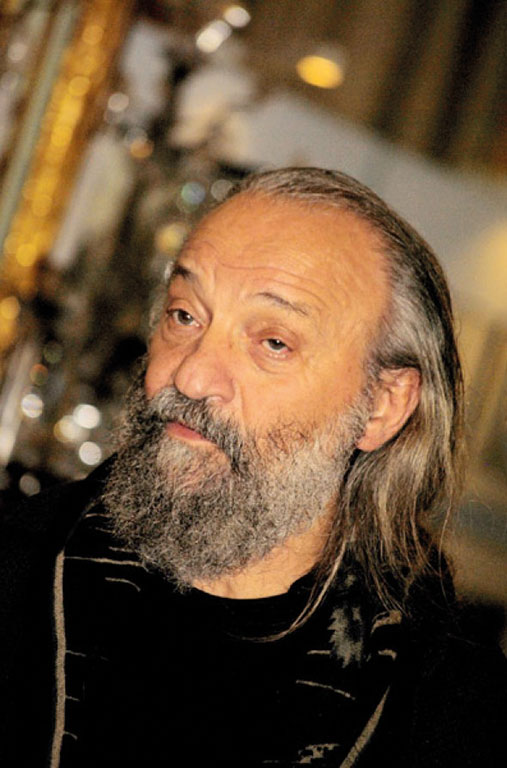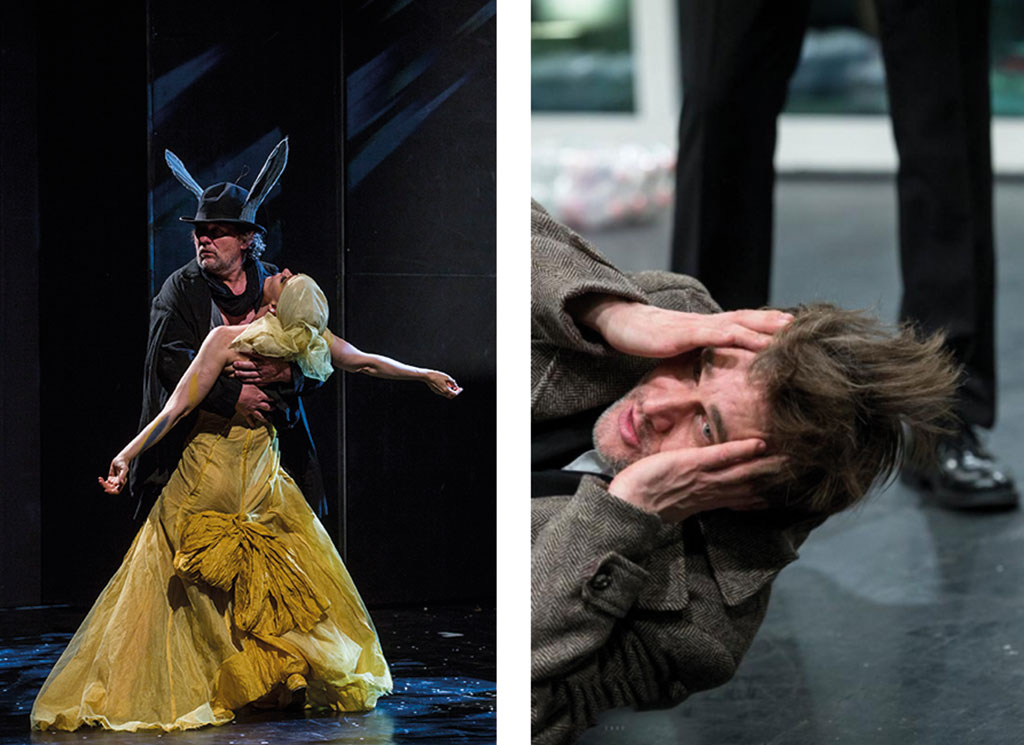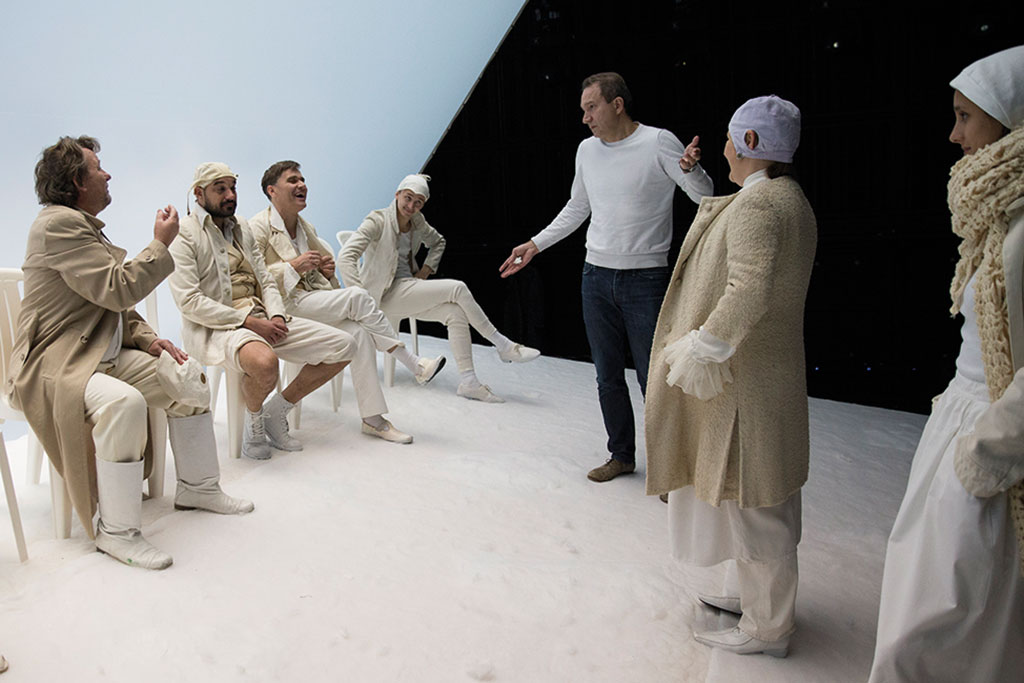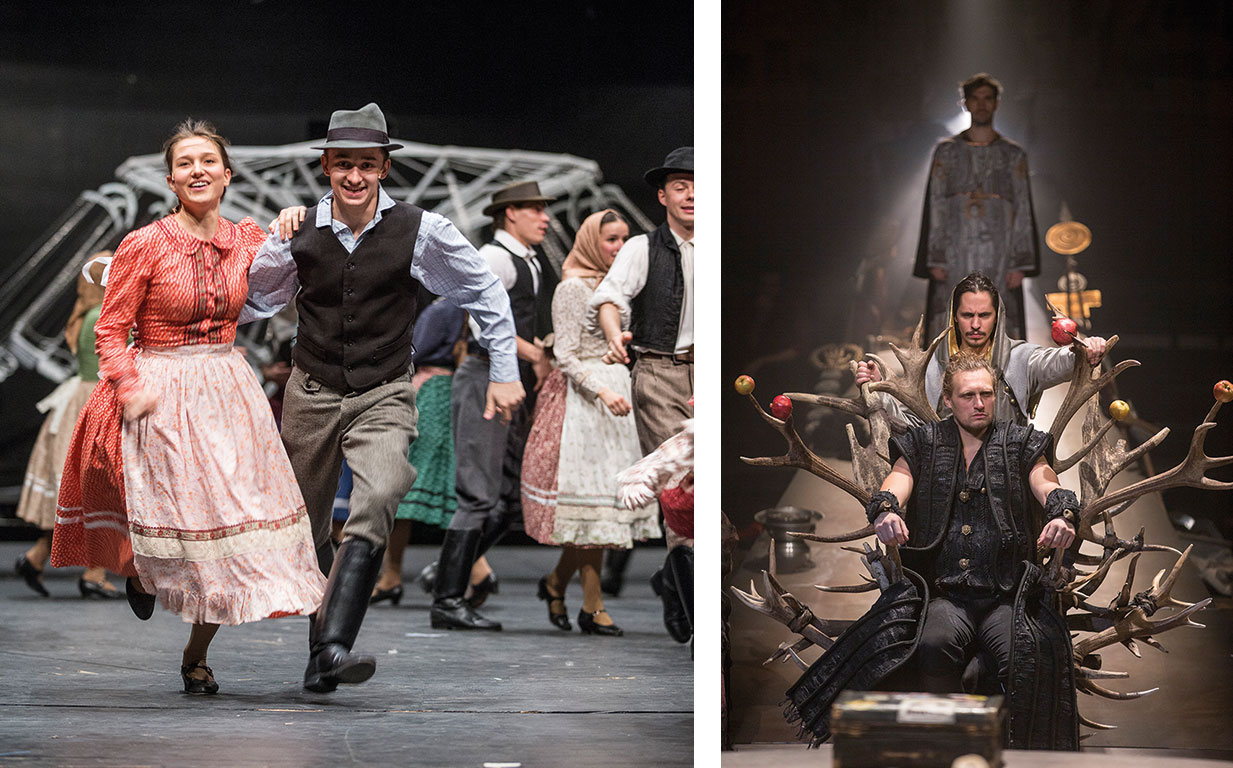Archives 2016
“Once We Know One Another, We Need Not Start Everything All Over Again”
Zsolt Szász (Zs. Sz.): As a former organiser of festivals, I have the question come to me, time and time again, as to why one undertakes a not quite seamless stunt like MITEM. Several times the ongoing festival (of 2015) has reminded me of the probably most memorable one in my life, the Third Theatre Olympics (Russia, Moscow, 2001), and the programme series entitled The Eye – Slanted Scythians View, conducted by Anatoly Vasiliev, within that. I immediately thought that, in contrast to the gigantic event which was meant to represent the new Russia, Vasiliev endeavoured to elevate the local colours and traditions which were truly typical of the empire. Furthermore, he invited Far East ritual theatres from other Asian countries, for example. There was no Hungarian theatre among the official ones representing the European mainstream of the time. The three companies invited from Hungary, comprising the theatre from Beregszász under your direction[1] then, my Hattyúdal ensemble (Swan Song Theatre)[2] and Éva Kanalas’s Ojanna Hangszínház (Ojanna Voice Theatre)[3], featured in Vasiliev’s programme. To my mind, Vasiliev took such a cultural-political stance, at the same time, by this enterprise, as is worth referring to in retrospect, especially today when the question arises as to whether the future will see a Europe of Nations or a United States of Europe on the American analogy.
Attila Vidnyánszky (A. V.): Knowing Vasiliev, I think it might rather have been the case that he, taking advantage of organising the Theatre Olympics, managed to get the decision makers to finance his programme separately as the initiation of his newly inaugurated theatre. By the way, he has never made productions which would respond to present-day political issues. He considers theatre, and art in general, at another level. He uses a lot more mature language and a universal dimension to describe the relationship between politics and theatre, even today when he is working in France. It would never occur to him, or to me for that matter, to come up with a piece of theatre about the emergence of migrants on the next day. While of course I am terribly interested in this phenomenon, and I read the news and have an opinion, too. Still, I do not take it up the stage, and there is the daily press to deal with it. Art, I think, is intended to do a lot more than this. If we take the award-winning productions at this year’s theatre or film festivals for instance, it will be easy to see what the “trendy” topics are in Europe today. Hungarian criticism also praises these, that is why I cannot do anything with it: even if a director stages a deep human drama, he will be judged by his preoccupation, or the lack of it, with these current issues. So art is sacrificed on the altar of politics. This expectation extorts from creative artists the use of a manner of speech which I consider anti-art. This sort of compulsion for conformity is especially characteristic of the new generation: since their “masters” plant this idea in their mind, most of them will not graduate as freethinking artists, which at least retards the process of finding their own voice.

Zs. Sz.: Unfortunately this is understandable because they want to succeed at all costs. The emblematic artists of the previous generations had a different attitude. Tadeus Kantor said he believed more in art than in life. And Eugenio Barba articulates that his identity is primarily determined by art and artistic practice, and it even overrides his relation to his mother tongue and sense of national identity. It is also interesting that although they do not belong to the same generation, both of them created their greatest work in the ‘70s and ‘80s, that is after the Beats had petered out, which no longer represented the sort of counterculture produced by the so-called great generation of the ‘60s.
A. V.: If we come to think of it, the Beat Generation let the genie out of the bottle by its own rebellion. Now we are left holding the bag. Eugenio Barba was not exempt from the often contradictory ideologies of the ‘60s, either. However, the decisive motivation in his case was that he, a young man driven by a commitment to the political left, became a theatre person in Jerzy Grotowski’s workshop in Poland. As revealed in his book, which has, at last, now been published also in Hungarian, it was a most conscious decision on his part to head in the direction of this very Eastern European socialist country.[4]
Zs. Sz.: The new mass cultural phenomenon of the ‘60s, namely the spread of rock festivals, gave fresh impetus to international theatre meetings. There are more and more theatre festivals emerging nowadays. Some of them are thematic events, but the one you founded two years ago, MITEM (Madách International Theatre Meeting), is not. The question justly arises after the second festival: what are the philosophy behind and the immediate benefits of this meeting? The invitation of mature directors who mostly work with permanent companies obviously reflects a conscious intention on your part.
A. V.: Unlike domestic sceptics, I consider Hungarian theatre culture to be on a par with the world’s theatre scene – and I dare say that because I have attended enough festivals abroad. With regard to MITEM, I have long-term projects: I would like the successful directors and companies to become returning guests, since this is the only chance to deepen professional dialogue. In Debrecen I already made some efforts at opening up to Europe[5] – primarily by opera. However, these attempts did not always produce the desired results. Drama turned out to be more rewarding: this was the time when cooperation began with Victor Rizhakov and Andrzej Bubień, who have, since then, directed for the Nemzeti Színház, too[6]. But I think MITEM also lends itself to provide an occasion for directors who would be happy to work with our company in the future to make an appearance. I could mention David Doiasvili for example, who, after Macbeth at the first MITEM, came to stage Shakespeare’s A Midsummer Night’s Dream, one of last season’s most acclaimed productions. Victor Rizhakov took root in the Hungarian milieu earlier in Debrecen: while he left a very deep impression on several actors there, he, too, thought that we had actors with whom it would be worth working together time after time – so I no longer look upon him as a guest director. By the way, we do not work for ourselves only by this festival – it would make me most delighted if other Hungarian theatres also employed the foreign directors we have invited to MITEM. Yet it can also happen that although a high-standard production is created, the actors’ souls need months-long tending – in this case the question certainly arises whether the particular director is worth re-inviting. Nevertheless, the same applies within the country, too. Take Sándor Zsótér for instance, who was present at this year’s MITEM with Brand – actors had been happy leaving the rehearsals and the outcome was interesting and convincing, so he will also be given continuous opportunity to work with us.

(photos: Zsolt Eöri Szabó)
Zs. V.: These directors, like yourself, are in their fifties. Your generation, after the great creators who started their career in the ‘60s, seems to be speaking a different theatrical language.
A. V.: I believe that it is such a difficult and complex profession that you do not mature before the end of your forties, or rather fifties. No wonder that a director in their forties still counts as young with the Russians. Now the contingent present at MITEM is one of directors who create determinative productions in the outstanding theatres of their own countries. On this basis, a genuine image of contemporary world theatre may be formed. It is another question whether this generation has enough talent in comparison with the previous one, or whether it is less eminent, resourceful or courageous than its predecessors. Surely, we are hunting among younger colleagues as well and this is how Thomas Jolly, the proclaimed enfant terrible in France, appeared on our horizon this year[7]. However, the main intention is to show where the best ones are.
Zs. Sz.: Have you been invited abroad since you are at the head of the Nemzeti Színház (National Theatre)?

A. V.: I have always been. But those who know me are aware that I do not hunt for invitations. I have cancelled every invitation over the last nine to ten years. Nonetheless, I may go to Saint Petersburg this time to stage Dostoyevsky because I regard it as a professional challenge with the actors there. I have never been attracted to the idea itself of going to direct at the repertory theatre of any other country, especially in a foreign language. I am not interested in that personally, even if I get paid five times more than at home. Having graduated from the Kyiv National University of Theatre, I obviously have a somewhat strong attachment to Russian culture. Therefore I find it hard to resist if I am invited by Saint Petersburg to direct Dostoyevsky. Still, I feel that I must work in the service of Hungarian and not foreign theatrical structure with my skill set. This is my first and foremost task.
Zs. Sz.: I do not think that the burning issues in contemporary theatre have been mentioned yet at the MITEM professional programmes. How do you see that?
A. V.: You are right. We are just beating around the bush, but in order to engage in a continuous dialogue it is necessary to meet year after year. Though it is interesting to invite new participants each time, we are not going to get deeper unless we have returning directors and companies. It is similar to guest direction. Once we know one another, we need not start everything all over again. Mind you, the system of theatres today is like a huge factory system – whether you think in terms of Europe or the whole world. Masses of performances need to be produced and a lot of directors are required to serve this manufacturing industry. It is not that hard to get into this system once you really want to. And you will certainly find it easier to get in if you accept the rules of what to talk about and in what manner, as well as what messages are worth formulating. But, as I have already said, I cannot identify with the messages which are currently being composed in Europe. Nor with the manner in which productions are made. The three weeks allotted for a guest direction – like in London, for example, where I was last invited – is not even enough to sit down for coffee with the actor twice. And what will inevitably happen then is that the director reaches for his well-established clichés…
Zs. Sz.: Apropos of the professional programmes Nina Király had the acumen to say that there had been nothing new under the sun for a hundred years: the same questions were still relevant in the theatre as the ones posed by the great theorist-directors at the beginning of the 20th century, like for instance Meyerhold or Stanislavsky.
A. V.: That is right. Then the ‘60s came along, when creators, such as Peter Brook, Tadeusz Kantor and primarily Jerzy Grotowski, were trying to reinterpret these axioms. I do not see any ambition of this kind in the new generation, but nor has our generation been characterised by a theoretical interest or an intention to reformulate ideas. We work, make our productions, one after the other. Nowadays there are fashionable trends rather than new concepts stemming from philosophical grounds. Though the time may be ripe just now, when there may be a turning point for basic questions to start carrying more weight again. It never occurred to me before to say anything about what I was doing, however, I have become motivated to do so now.
Zs. Sz.: At this point the question of theatre training is unavoidable. You yourself are professor at Kaposvári Egyetem (Kaposvár University), therefore you have first-hand experience of the present situation.

(photos: Zsolt Eöri Szabó)
A. V.: We are trying to go against the common European tendency of merging the colours which have characterised the ethnic communities of the particular countries over centuries. I think that we, Hungarians, must make last ditch efforts to insist on our distinctive cultural values. As far as the standard of training is concerned, it seems to me that theatre schools in East-Central Europe are higher-quality and more comprehensive than in the West. The duration of training is longer as well, with courses lasting five years after the addition of an extra one a few years ago, whereas the length of studies over there is only three years or even, in many cases, only two now.
Zs. Sz.: I am under the impression that both your stagings this year, Körhinta (Merry-Go-Round)[8] and Isten ostora – Flagellum Dei[9], on Attila, king of the Huns, have had an extremely positive reception from the foreign professional audience at MITEM. The latter one won almost all the important awards at POSZT[10] in June, which had never before happened during the course of your career. On reading the comments following the jury’s decision, I could see that no cloudless joy was in store for you.
A. V.: Yes, this is just about the way I felt. Nevertheless, I was made happy by the audience’s unanimously positive spontaneous reaction. At the professional evaluation on the following day, I could see it with my own eyes how embarrassed the dominant, and, to me, hostile voices of the profession became when these video-recorded utterances were played. And the viewers were far from succinctly articulating their opinion or why they liked what they had seen. Still, it was obvious that they all got emotionally involved in the production. This experience also justifies my belief that what can be readily formulated by means of specific clichés at the intellectual level is not cardinal in the reception of theatre. The spontaneous reactions of the heart and the soul in art have always been more important than rational judgement. There were even periods, for example Romanticism, which considered the heart, and not the brain, as the central organ of human intelligence.
Zs. Sz.: I think that a couple of years ago Isten ostora would have sparked a furious response if only on account of Attila’s non-displaceable cult. However, even your professional opponents can presumably feel by now that this topic is gaining relevance – if I may just allude to the contemporary “migration” which has speeded up over the last months. During the present general crisis of Europe the question is no more what these Hungarians want with this outdated “fairy-tale hero”, but that probably the last fifteen hundred years need rethinking, starting from the fall of the Roman Empire. It has become apparent by now that Attila is not only the mythic hero of Hungarians, but also a key figure of this historical transition, who represented a Euro-Asian model in relation to rule and power, a concept diametrically opposed to the one which Charlemagne later established in Europe and is still in effect today. From this angle, your production is not of a Hungarian perspective really, instead, it problematises the Europe versus Asia dichotomy.
A. V.: Exactly. However, in hindsight, I must confess that I was tempted by the idea of staging a topicalised version of this Bánffy drama. Then I resolved that it would be a shame to sacrifice this theme on the altar of the swelling waves of current European politics. And I believe I have made the right decision.
“Once We Know One Another, We Need Not Start Everything All Over Again”
Zsolt Szász Interviews Attila Vidnyánszky
It was in the 2015 March-April issue of Szcenárium that Attila Vidnyánszky was interviewed apropos of the topic of the roundtable on “National Theatres in the 21st Century” at the professional programme of MITEM. Now he articulates his ideas on the philosophy and experience of two years’ MITEM, his feeling of antipathy against “trendy” European topics, the ideal of artistic freedom, as well as the different attitudes of the predecessor- and successor generations. He asserts that he considers Hungarian theatre culture to be on a par with the world’s theatre scene. He says he welcomes at MITEM the returning companies and guest performers with whom the Nemzeti Színház (National Theatre) may enter into a lasting partnership. He mentions that European countries, Hungary included, must insist on their distinctive cultural values. Then, in connection with both the professional and audience success of Isten ostora – Flagellum Dei, on Attila, king of the Huns, at POSzT (Pécsi Országos Színházi Találkozó – Pécs National Theatre Festival), he formulates his artistic creed this way: “The heart, the spontaneous reaction of the soul in art has always been more important than rational judgement.”
[1] The Illyés Gyula Magyar Nemzeti Színház (Gyula Illyés Hungarian National Theatre) in Beregszász, Ukraine, or as it is now called, the Kárpátaljai Megyei Magyar Drámai Színház (County Drama Theatre of Sub-Carpathia), was established by Attila Vidnyánszky in 1992.
[2] The Hattyúdal Színház (Swan Song Theatre) was an alternative theatre ensemble between 1994 and 2007, led by Zsolt Szász.
[3] Éva Kanalas is a folk singer and ethnographer. See her interview in the September issue of Szcenárium 2015, pp. 81-89, also available on the homepage of the Nemzeti Színház.
[4] Eugenio Barba: Hamu és gyémánt országa. Tanulmányaim Lengyelországban. 26 levél Jerzy Grotowskitól Eugenio Barbának. Fordította: Regős János és Pályi András. Nemzeti Színház Kiskönyvtára, Budapest, 2015. (E. Barba: The Land of Ashes and Diamonds. My Apprenticeship in Poland. 26 Letters to Eugenio Barba from Jerzy Grotowski. Translated into Hungarian by János Regős and András Pályi, published by the Nemzeti Színház Kiskönyvtára (Library of the National Theatre).
[5] Attila Vidnyánszky was director of Csokonai Színház (Csokonai Theatre), Debrecen, between 2006 and 2013.
[6] Victor Rizhakov staged Gorky’s The Lower Depths (Éjjeli menedékhely) at the Nemzeti Színház in 2014; Andrzej Bubień staged Gombrowitz’s Operetta here, in the same year.
[7] Thomas Jolly made his debut as director of Marivaux’s Harlequin Refined by Love.
[8] Sarkadi, Imre – Fábri, Zoltán – Nádasy, László – Vincze, Zsuzsa: Merry-Go-Round (premiere: 20th February 2015.)
[9] Flagellum Dei – adapted from the drama by Miklós Bánffy, A nagyúr (Great Lord) (premiere: 15th Decmber, 2014.)
[10] POSZT is short for Pécsi Országos Színházi Találkozó (National Theatre Meeting in Pécs), which, as the most significant professional forum for the Hungarian theatre scene, has been organised annually since 2000.
(15 April 2016)











